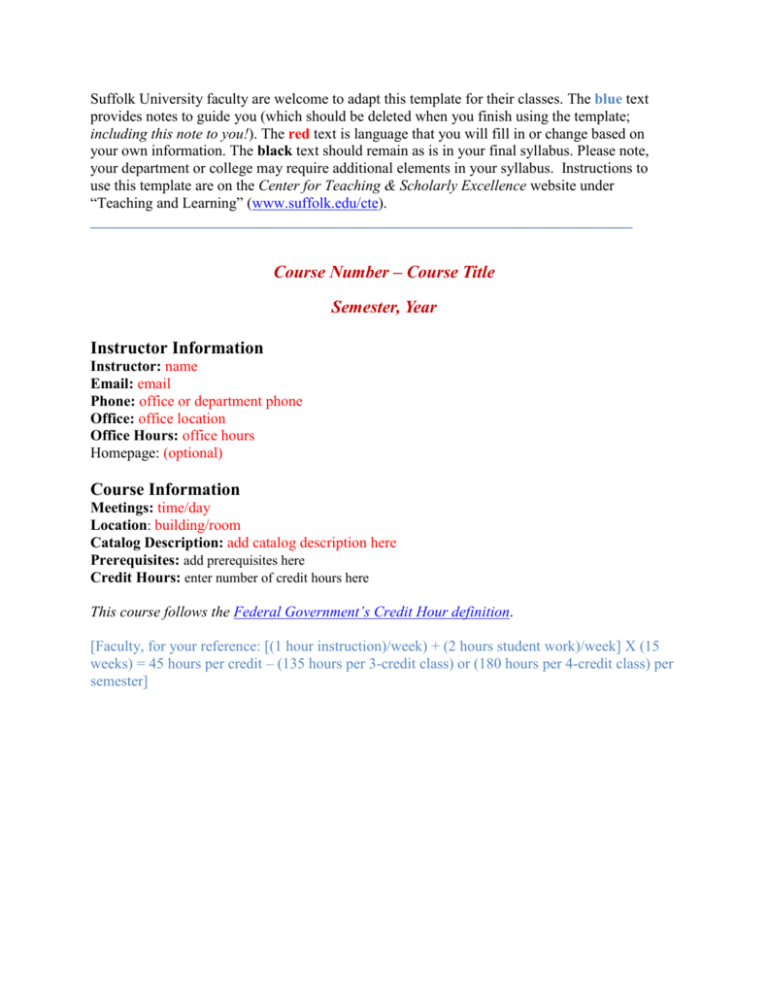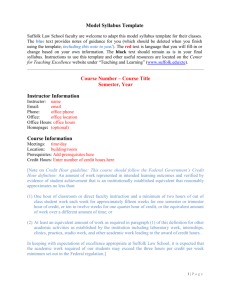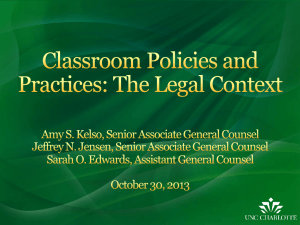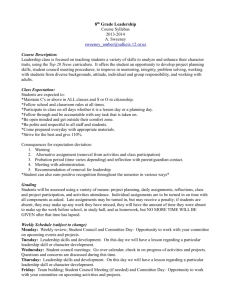Syllabus Template. - Suffolk University
advertisement

Suffolk University faculty are welcome to adapt this template for their classes. The blue text provides notes to guide you (which should be deleted when you finish using the template; including this note to you!). The red text is language that you will fill in or change based on your own information. The black text should remain as is in your final syllabus. Please note, your department or college may require additional elements in your syllabus. Instructions to use this template are on the Center for Teaching & Scholarly Excellence website under “Teaching and Learning” (www.suffolk.edu/cte). ________________________________________________________________________ Course Number – Course Title Semester, Year Instructor Information Instructor: name Email: email Phone: office or department phone Office: office location Office Hours: office hours Homepage: (optional) Course Information Meetings: time/day Location: building/room Catalog Description: add catalog description here Prerequisites: add prerequisites here Credit Hours: enter number of credit hours here This course follows the Federal Government’s Credit Hour definition. [Faculty, for your reference: [(1 hour instruction)/week) + (2 hours student work)/week] X (15 weeks) = 45 hours per credit – (135 hours per 3-credit class) or (180 hours per 4-credit class) per semester] Course Name Semester, Year Syllabus Instructor’s Additional Course Description Add additional description here Textbook/Course Materials List required texts and materials here and note whether they can be obtained in the university bookstore (e.g. textbooks, calculators, readings, clickers, etc.) Course Goals & Learning Objectives GOALS Upon successful completion of this course, students should be able to know/understand: Include broad course goals in this column using the verbs “know” and “understand” OBJECTIVES Upon successful completion of this course, students should be able to: ASSESSMENTS How the student will be assessed on these learning objectives: Include skills that students will learn through the course in this column Include examples such as assignments, group presentations, discussions, etc. in this column Add more lines as needed [Faculty: this table assures that your course is “instructionally aligned” – that you measure what students practice/learn and you have students practice/learn what you define as course goals. Instructional alignment is the single best predictor of both student learning and student ratings. If you come up with an empty cell or leftover course components, then the course is not aligned. For examples of course goals and learning objectives and tips for how to write them, see www.suffolk.edu/cte and click on “Teaching and Learning” then on “Tips for writing course goals and learning objectives.”] Assignments/Exams/Papers/Projects Students will be evaluated in the following areas: Briefly describe assignments and assignment weights [Faculty: we propose including this phrase if your course collects any assignments for Assurance of Learning purposes, or has the potential to (e.g. senior writing samples):] Select assignments in this course may be used by our accreditation team for institutional assessment purposes and will be handled confidentially. Course Name Semester, Year Syllabus Grading/Evaluation [Faculty: you need to inform students of the factors to be considered in determining grades and the specific weight to be assigned. If you have a penalty for late work, include it here. Please also include a grade scale if applicable for your course. (A common policy is a certain percentage of the grade taken away for each day late.) For examples of grading scales and evaluation descriptions, see www.suffolk.edu/syllabus.] Describe grading [Faculty: If you use the Blackboard Gradebook, make sure than any grade scale you include in your syllabus matches the grade scale used on Blackboard. You might also consider a caution to students so you reserve the right to make corrections such as the following: Please consider the online gradebook as a courtesy to you, subject to errors given various upgrades and shifts in the software. I reserve the right to make gradebook corrections to keep it consistent with the syllabus so that your grade reflects true performance, not software or user error. If you see something that doesn’t make sense, please alert me! Thanks so much for your help.] Course Policies [Faculty: Over time a syllabus can become filled with rules and orders and can discourage a positive course environment. Be sure you ask for the behavior you want to see, not just the behavior you don’t want. Don’t create any policies you aren’t willing to implement. Inconsistencies in following policies lead to student complaints. The policies described below are a minimum requirement for your syllabus.] This course abides by university policies that can be found here: www.suffolk.edu/syllabus. In particular, please note the following: Participation/Attendance Policy Absences and Attendance Policy from the Student Handbook: www.suffolk.edu/studenthandbook [Faculty: The Student Affairs Office does not excuse absences and students are encouraged to discuss their absences and how they may impact their grades directly with their instructors. The Student Affairs Office may inform instructors if a student has missed classes for a week or longer or is experiencing a serious personal emergency. Students' medical information is private. Instructors should not request medical information such as doctors' notes from students. Students should provide such documentation to the Student Affairs Office when absolutely necessary. You may want to use the word “participation” instead of the word “attendance” as a student can attend without being present/learning from the class. Also, consider including an inclement weather statement like the following:] Course Name Semester, Year Syllabus In the event that the university cancels classes, such as for severe weather, students are expected to continue with readings as originally scheduled. Any assignments scheduled during those missed classes, such as an exam or paper, are due at the next class meeting unless other instructions are posted at the course website or communicated via email. Disability Accommodations Statement on Accommodations for Students with Disabilities (CAS & SBS) If you determine that you need formal, disability-related accommodations, it is very important that you register with the Office of Disability Services (located at 73 Tremont Street, 7th floor, 617.994.6820, disabilityservices@suffolk.edu) and notify me of your eligibility for reasonable accommodations. We can then plan how best to implement your accommodations. For more information, look here: www.suffolk.edu/disability. Statement on Accommodations for Students with Disabilities (Law School) If you anticipate issues related to the format or requirements of this course due to the impact of a disability, it is important that you contact the Law School’s Dean of Student Office (located at 120 Tremont Street, 4th floor, 617.573.8157, or lawdeanofstudents@suffolk.edu) for further information and assistance, including information on disability-related accommodations. We can then plan how best to coordinate any accommodations. Academic Honesty, Cheating, and Plagiarism [Faculty: It is your responsibility to discourage academic dishonesty through word and deed. Academic dishonesty should be reported to the Dean of Students. For more information, check out www.suffolk.edu/syllabus] Student Resources The university provides a range of student services. To learn more, explore this webpage: www.suffolk.edu/syllabus Course Schedule [Faculty: Provide students with a list of dates that the course is meeting. The chart below is an example of a course schedule in grid form. Include holidays when the course will not be meeting and any make-up days. The course schedule should also include reading and other assignments that you would like students to complete before coming to class. The generic statement in red reminds students about possible changes.] The schedule, policies, procedures, and assignments in this course are subject to change in the event of extenuating circumstances, by mutual agreement, and/or to ensure better student learning. Week (with Date) General Topic Reading Assignment/Other Course Name Semester, Year Syllabus Assignment 1 2 3 4 5 6 7 8 9 10 11 12 13 14 15 Final Exam Date & Time









